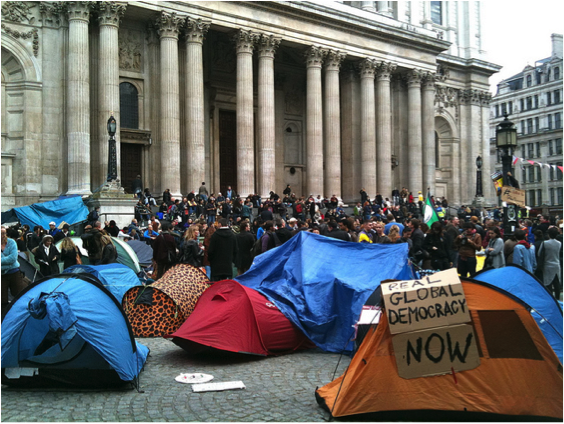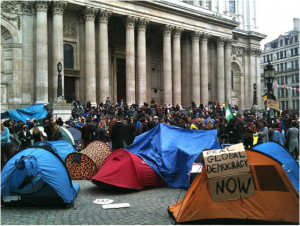Speaking in the Language of Fossil Fuels

Popular methods of activism – the protest, the march, the sit-in – are, though engaging and exciting, nonetheless insufficient to achieve the lasting political change they seek. Indeed, it is in their very identity as local and ‘on-the-ground’ movements that they are unable by themselves to change a problem which is globally pervasive and structurally entrenched. Flag-bearing parades, direct actions and the disobedient occupation of public space are effective ways to inspire, educate and collectivise; but grass-roots and populist movements must not overlook the structural and economic roots of the problems they protest against.
The achievement of climate justice can feel so daunting in part because we must participate in its very injustices in order to change it. I was travelling back from Paris in December 2015, returning to the Netherlands with a group of Dutch environmental activists from a weekend abuzz with protests and activism workshops, as the last days of the COP21 Climate Conference drew to a close. The bus had pulled into a highway service station, to rest and refuel. So enthused were we from the day’s earlier events that it was spontaneously decided to stage a protest at the service station’s garage, whose pumps and booths were awash with the reds and yellows of the Royal Dutch Shell logo. Some scrambled to find flags, others to take photos, and the rest to erect a ‘Keep it in the Ground’ banner across the entrance. A chant grew louder, as the whole group joined in: ‘Fuck Shell, fuck Shell, fuck Shell!’
[perfectpullquote align=”full” cite=”” link=”” color=”” class=”” size=””]We were all obligingly complicit in the very environmental destruction we had proudly protested against just hours ago.[/perfectpullquote]It was exciting to engage in civil dissidence, to make a political statement, and to be part of a passionate group of people whose behaviour and ambitions were led by a strong desire to improve the world. But I struggle to believe that I was the only one to notice the tragic irony of this Shell station protest, staged just minutes after its pumps had supplied our bus with the fuel we relied on to take us all home. Indeed, we were all obligingly complicit in the very environmental destruction we had proudly protested against just hours ago, and would go on to shout just moments later. We would have preferred to use an electric bus, but they are currently too expensive, and not yet popularly accessible. Rather, for now, the more established infrastructure of combustible carbon is the cheaper and practical choice, silently drip-feeding fossil fuels into seemingly every service and product that we use, whether we like it or not. Indeed, if I came away with anything from the COP21 protest it was that, alongside the seemingly immoveable monolithic fossil fuel industry, with its dictates over consumer choices and political decisions, symbolic and transient events such as sit-ins, Occupy, and marches seem woefully weak in comparison.
 In Inventing the Future: Postcapitalism and a World Without Work (2015), Alex Williams and Nick Srnicek analyse the contemporary political left, ultimately criticising it as failing to erect any robust political alternatives to the neoliberal economic and political ideology that is dominant today. They accuse contemporary methods of leftist political dissidence as vague, and lacking ambition and strategy; as ‘a melange of wild and varied demands’; and they point to protest camps as popularised by the Occupy Movement as ‘ephemeral, small-scale and ultimately unable to challenge the larger structures of the […] system’. Think of the Occupy campsites of London and New York, which at first flashed excitedly into public awareness, only to disappear gradually after failing to articulate any coherent political alternatives to the problems they protested against. The authors go on to diagnose such forms of protest as, though somewhat unified, ultimately ‘survival mechanisms, not a desirable vision for the future’. They use the term ‘folk politics’ to describe such a guiding ideology, which emphasises ‘temporal, spatial and conceptual immediacy’; as reactive rather than pro-active; and defined in part by a ‘fetishisation of immediate results [which] leads to an empty pragmatism […] rather than seeking to change structural conditions.’ Williams and Srnicek propose that in being defined as local, direct, and anti-establishment, these methods of folk politics have at the same time forgone the opportunity to engage their issues at less direct but more influential infrastructural and economic levels. Indeed, in its rejection of abstract economic models and far-flung political meetings, ‘folk politics aims to bring politics down to the “human scale”’.
In Inventing the Future: Postcapitalism and a World Without Work (2015), Alex Williams and Nick Srnicek analyse the contemporary political left, ultimately criticising it as failing to erect any robust political alternatives to the neoliberal economic and political ideology that is dominant today. They accuse contemporary methods of leftist political dissidence as vague, and lacking ambition and strategy; as ‘a melange of wild and varied demands’; and they point to protest camps as popularised by the Occupy Movement as ‘ephemeral, small-scale and ultimately unable to challenge the larger structures of the […] system’. Think of the Occupy campsites of London and New York, which at first flashed excitedly into public awareness, only to disappear gradually after failing to articulate any coherent political alternatives to the problems they protested against. The authors go on to diagnose such forms of protest as, though somewhat unified, ultimately ‘survival mechanisms, not a desirable vision for the future’. They use the term ‘folk politics’ to describe such a guiding ideology, which emphasises ‘temporal, spatial and conceptual immediacy’; as reactive rather than pro-active; and defined in part by a ‘fetishisation of immediate results [which] leads to an empty pragmatism […] rather than seeking to change structural conditions.’ Williams and Srnicek propose that in being defined as local, direct, and anti-establishment, these methods of folk politics have at the same time forgone the opportunity to engage their issues at less direct but more influential infrastructural and economic levels. Indeed, in its rejection of abstract economic models and far-flung political meetings, ‘folk politics aims to bring politics down to the “human scale”’.
 But fossil fuel extraction is not an immediately ‘human’ issue in this way, and is neither one that will be solved by poorly defined appeals to ‘ethically-responsibly’ limits on carbon emissions. It is, as echoed by Naomi Klein in This Changes Everything: Capitalism vs. the Climate (2014), an industry deeply embedded within globally pervasive economic models and assumptions, and a major stilt on which the global economy sits. So – one cannot simply hurl ‘fuck you’-s to Shell and realistically expect anything to change; one cannot present pictures of stranded polar bears and hope for the best, despite these being valid forms of awareness-raising in their own right. Rather, we must realise that Shell’s business model is simply a response to the capitalist creed of incessant growth and dividend-distribution to participating shareholders, and that likely no-one working at Shell goes to bed feeling as if they have acted ‘unethically’ that day. Rather, they have acted as effectively as they could within the growth-based economic framework they have been given. This is not, however, to excuse such energy giants, nor to pardon political weakness on climate change mitigation; it is only to try to assess their decisions with the clarity of context.
But fossil fuel extraction is not an immediately ‘human’ issue in this way, and is neither one that will be solved by poorly defined appeals to ‘ethically-responsibly’ limits on carbon emissions. It is, as echoed by Naomi Klein in This Changes Everything: Capitalism vs. the Climate (2014), an industry deeply embedded within globally pervasive economic models and assumptions, and a major stilt on which the global economy sits. So – one cannot simply hurl ‘fuck you’-s to Shell and realistically expect anything to change; one cannot present pictures of stranded polar bears and hope for the best, despite these being valid forms of awareness-raising in their own right. Rather, we must realise that Shell’s business model is simply a response to the capitalist creed of incessant growth and dividend-distribution to participating shareholders, and that likely no-one working at Shell goes to bed feeling as if they have acted ‘unethically’ that day. Rather, they have acted as effectively as they could within the growth-based economic framework they have been given. This is not, however, to excuse such energy giants, nor to pardon political weakness on climate change mitigation; it is only to try to assess their decisions with the clarity of context.
In the contemporary landscape of political fear and uncertainty, it is vital that we make our voices heard in both the public and private sphere. But provocative and emotional language is limited – we must go on to engage climate change in the language of economics its industry knows most fluently, and not forget to seek change at this higher level.

[…] Also published here. […]